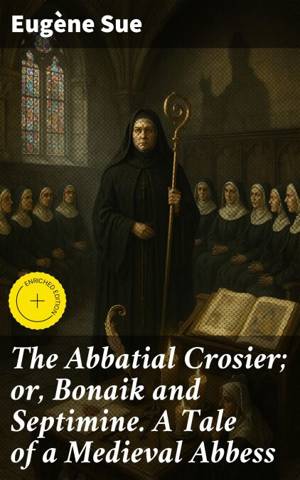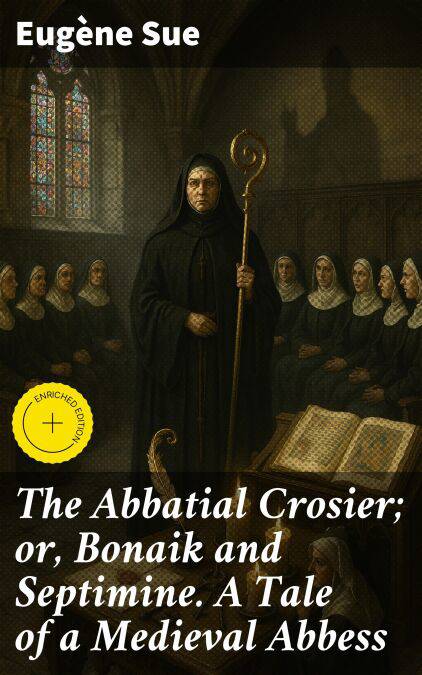
Bedankt voor het vertrouwen het afgelopen jaar! Om jou te bedanken bieden we GRATIS verzending (in België) aan op alles gedurende de hele maand januari.
- Afhalen na 1 uur in een winkel met voorraad
- In januari gratis thuislevering in België
- Ruim aanbod met 7 miljoen producten
Bedankt voor het vertrouwen het afgelopen jaar! Om jou te bedanken bieden we GRATIS verzending (in België) aan op alles gedurende de hele maand januari.
- Afhalen na 1 uur in een winkel met voorraad
- In januari gratis thuislevering in België
- Ruim aanbod met 7 miljoen producten
Zoeken
The Abbatial Crosier; or, Bonaik and Septimine. A Tale of a Medieval Abbess E-BOOK
Enriched edition. Intrigue and Power in the Medieval Convent: A Tale of Triumph and Betrayal
Eugène Sue
E-book | Engels
€ 1,99
+ 1 punten
Omschrijving
Eugène Sue's "The Abbatial Crosier; or, Bonaik and Septimine. A Tale of a Medieval Abbess" offers a richly woven narrative set against the backdrop of medieval Europe, illuminating the complexities of religious life and the societal roles of women during this era. Employing a blend of realism and romanticism, Sue's literary style is characterized by vivid characterizations and intricate plots that engage the reader's imagination while providing a critical commentary on the ecclesiastical power structures of the time. This work dives deep into the themes of faith, power, and the often-misunderstood lives of nuns, revealing both their struggles and their influence within the patriarchal structures of their communities. Eugène Sue, a pioneer of the feuilleton genre, was deeply influenced by the socio-political upheaval of his time, particularly the 1830 Revolution in France. His background as a naval officer and eventual transition into writing allowed him a unique perspective on societal injustices and the human condition. Sue's advocacy for social reform and his engagement with popular literature laid the groundwork for his exploration of challenging themes in "The Abbatial Crosier," reflecting his desire to shed light on marginalized voices within history, particularly that of women in religious contexts. Readers seeking an immersive exploration of medieval life and the complexities of faith will find Sue's work both illuminating and captivating. With its intricate narrative and profound insights into the lives of women in power, "The Abbatial Crosier" serves not only as a compelling tale but also as an important historical commentary. This book is recommended for anyone interested in feminist literature, historical fiction, or the interplay between faith and power.
In this enriched edition, we have carefully created added value for your reading experience:
- A succinct Introduction situates the work's timeless appeal and themes.
- The Synopsis outlines the central plot, highlighting key developments without spoiling critical twists.
- A detailed Historical Context immerses you in the era's events and influences that shaped the writing.
- A thorough Analysis dissects symbols, motifs, and character arcs to unearth underlying meanings.
- Reflection questions prompt you to engage personally with the work's messages, connecting them to modern life.
- Hand‐picked Memorable Quotes shine a spotlight on moments of literary brilliance.
- Interactive footnotes clarify unusual references, historical allusions, and archaic phrases for an effortless, more informed read.
In this enriched edition, we have carefully created added value for your reading experience:
- A succinct Introduction situates the work's timeless appeal and themes.
- The Synopsis outlines the central plot, highlighting key developments without spoiling critical twists.
- A detailed Historical Context immerses you in the era's events and influences that shaped the writing.
- A thorough Analysis dissects symbols, motifs, and character arcs to unearth underlying meanings.
- Reflection questions prompt you to engage personally with the work's messages, connecting them to modern life.
- Hand‐picked Memorable Quotes shine a spotlight on moments of literary brilliance.
- Interactive footnotes clarify unusual references, historical allusions, and archaic phrases for an effortless, more informed read.
Specificaties
Betrokkenen
- Auteur(s):
- Vertaler(s):
- Uitgeverij:
Inhoud
- Aantal bladzijden:
- 182
- Taal:
- Engels
Eigenschappen
- Productcode (EAN):
- 4064066190125
- Verschijningsdatum:
- 24/04/2021
- Uitvoering:
- E-book
- Beveiligd met:
- Digital watermarking
- Formaat:
- ePub

Alleen bij Standaard Boekhandel
+ 1 punten op je klantenkaart van Standaard Boekhandel
Beoordelingen
We publiceren alleen reviews die voldoen aan de voorwaarden voor reviews. Bekijk onze voorwaarden voor reviews.









